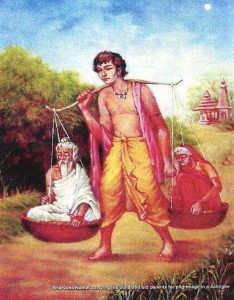May 13:
 “Without devotion, action and knowledge are cold and dry, and may even become shackles.”
“Without devotion, action and knowledge are cold and dry, and may even become shackles.”
–Gandhi (The message of the Gita, p. 26)
When Gandhi was a little boy, he notes, while in school, he rarely had the time or the inclination to read books that were not assigned for class. One book–a play– however, stood out: Shravana Pitribhakti Nataka. The tale is about a sturdy and faithful young man, Shravan, and his devotion to his very elderly and blind parents who wanted to spend the last years of their lives on pilgrimage. Shravan’s parents adored him, and their hearts were filled with joy when Shravan told them that he would help them fulfill their wish. Since the trip would be too physically difficult for them, he carried his parents around to sacred sites in slings held by a stick on his shoulders. Mom on one side, Dad on the other.
 Upon reaching the ancient holy city of Ayodhya, Shravan’s parents asked for some water, and he happily obliged, setting them down beneath a tree in a dense forest and walking with his jug toward the river bank. As he reaches down to fill the jug, it gurgles, and tragedy strikes. Shravan is hit by an arrow by King Dashrath (the future father of Lord Rama), who mistakes him for a deer. Realizing what he has done, he rushes over to Shravan and begs forgiveness. Shravan offers forgiveness as well as something he can do as an act of repentance: “Bring this water to my parents.” He adds, “Their hearts will be broken when they discover that their only son is gone.” Shravan dies by the river, and King Dashrath fulfills his duty to Shravan, returning to where he set his parents. When they finally discover what has happened to their son, Dasharth again asks forgiveness. They forgive him, too, though they point to the law of karma at work, for better or worse: it has already been set in motion, he has killed their son. (Dashrath will later lose his own son, Rama in a famous epic story). Dramatically, they let themselves die of a broken heart.
Upon reaching the ancient holy city of Ayodhya, Shravan’s parents asked for some water, and he happily obliged, setting them down beneath a tree in a dense forest and walking with his jug toward the river bank. As he reaches down to fill the jug, it gurgles, and tragedy strikes. Shravan is hit by an arrow by King Dashrath (the future father of Lord Rama), who mistakes him for a deer. Realizing what he has done, he rushes over to Shravan and begs forgiveness. Shravan offers forgiveness as well as something he can do as an act of repentance: “Bring this water to my parents.” He adds, “Their hearts will be broken when they discover that their only son is gone.” Shravan dies by the river, and King Dashrath fulfills his duty to Shravan, returning to where he set his parents. When they finally discover what has happened to their son, Dasharth again asks forgiveness. They forgive him, too, though they point to the law of karma at work, for better or worse: it has already been set in motion, he has killed their son. (Dashrath will later lose his own son, Rama in a famous epic story). Dramatically, they let themselves die of a broken heart.
The story of Shravan is told to model the ideal relationship between a parents and their children, highlighting devotion and service, in particular. “The story,” Gandhi says, “left an indelible impression on my mind.” “Here is an example for you to copy,” he told himself. Gandhi was indeed very devoted to his parents. It would not be an exaggeration to say that his work to free India through nonviolence and uphold the dignity of his tradition (and of humanity!) was the expression of that devotion.
Experiment in Nonviolence:
Do something for your parents today in the spirit of Shravan and nonviolence.
 Daily Metta 2015, a service of the Metta Center for Nonviolence, is a daily reflection on the strategic and spiritual insights of Mahatma Gandhi in thought, word and deed. As Gandhi called his life an “experiment in truth,” we have included an experiment in nonviolence to accompany each Daily Metta. Check in every day for new inspiration. Each year will be dedicated to another wisdom teacher.
Daily Metta 2015, a service of the Metta Center for Nonviolence, is a daily reflection on the strategic and spiritual insights of Mahatma Gandhi in thought, word and deed. As Gandhi called his life an “experiment in truth,” we have included an experiment in nonviolence to accompany each Daily Metta. Check in every day for new inspiration. Each year will be dedicated to another wisdom teacher.









Dear Stephaine, thank you for todays article,
i would like share this Buddhist Dharma talk on the topic of our parents, by Thay Phap An:
https://www.youtube.com/watch?v=RtSIH11anVk
Kind Regards,
Tord